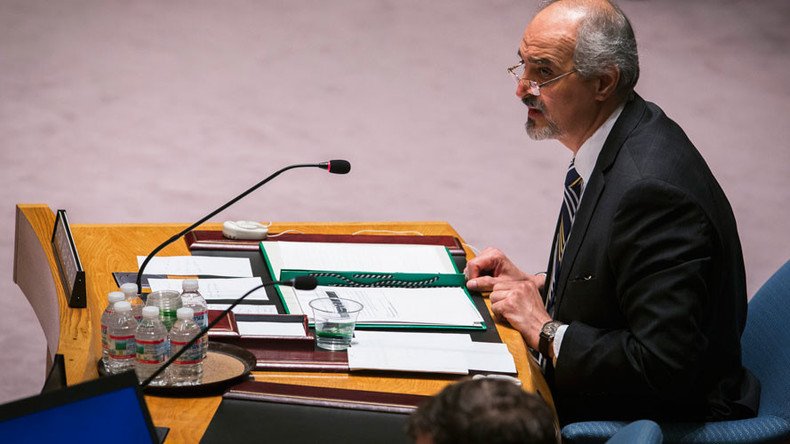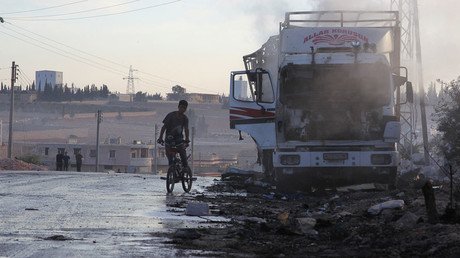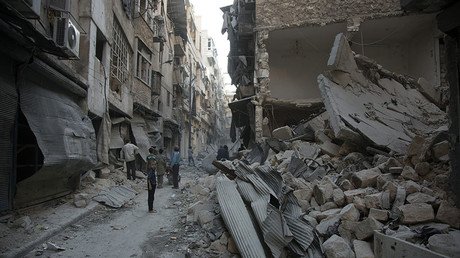Syria ‘won’t turn into Libya,' ready for talks without preconditions – Syrian UN envoy

Syria’s UN envoy said his country won’t turn into next Libya or Iraq, adding that Damascus is ready to resume peace talks without preconditions as Moscow and Washington urge the revival of negotiations.
Speaking at the UN Security Council (UNSC) on Wednesday Syria’s ambassador to the UN, Bashar al-Ja'afari, said his country "will not become another Libya or Iraq."
Earlier on Wednesday Russian Foreign Minister Sergey Lavrov said that the conflict in Syria as well as that of Libya and Iraq, have been “direct consequences” of the US-led military operations in the region.
Al-Ja'afari signaled that Damascus is ready to resume the stalled peace process to find a diplomatic solution to the years-long bloodshed in Syria.
"My country is ready to resume intra-Syrian dialogue with no preconditions and according to decisions and foundations that launched this very dialogue, in order to reach a political solution that is decided by the Syrians," Ja'afari said.
On Monday the Syrian army declared in a statement the end of the initial seven days ceasefire blaming “terrorist groups” for repeated violations and the use of the respective truce to simply regroup.
During Wednesday's UNSC meeting, Lavrov also slammed rebels groups, including those who’d signed up to the truce deal for “300 cases of violation of the cessation of hostilities.” His US counterpart, Secretary of State John Kerry, countered that the Syrian government was responsible for the violations.
The cessation of hostilities suffered a big setback on September 17 after US-led coalition airstrikes hit positions of Syrian government forces near the city of Deir ez-Zor. Over 80 soldiers were killed as a result of the attack. While Washington called the incident a mistake, Syrian leader Bashar Assad spoke of “flagrant aggression.”
And just two days later a UN humanitarian convoy heading to Aleppo was attacked, with 20 civilians and one aid worker killed as a result. It is still not clear who is behind the atrocity, with Lavrov declaring at the UNSC meeting that Russia had handed over all the relevant information on the case.
The UN announced Wednesday that it is gearing up to resume aid deliveries to civilian population in Syria.
"The preparation for these convoys has now resumed and we are ready to deliver aid to besieged and hard-to-reach areas as soon as possible," the UN Office for the Coordination of Humanitarian Affairs said, Reuters reported.
The outlet also cites a member of the World Health Organization (WHO), Elizabeth Hoff, as saying that humanitarian goods are also being prepared for delivery to the people in the Damascus suburb of Moadamiya.
“The convoy is being loaded today and scheduled for tomorrow," Hoff said.
Despite the existing difficulties both Lavrov and Kerry agreed that there can be no alternative to the peace process.
"We should not give in to this blackmail. The talks must be resumed immediately," Lavrov said.
John Kerry echoed the statements, saying that the agreements between him and the Russian FM are “far from perfect” but insisting there is no alternative.
The members of the International Syrian Support Group (ISSG), co-chaired by the US and Russia, also agreed yesterday they will not give up on attempts to enforce the ceasefire in Syria in accordance with the Geneva deal.
On Wednesday Sergey Lavrov also mentioned a possibility of a three-day “period of silence'' in Syria but it is not clear when and if it will be in place.














